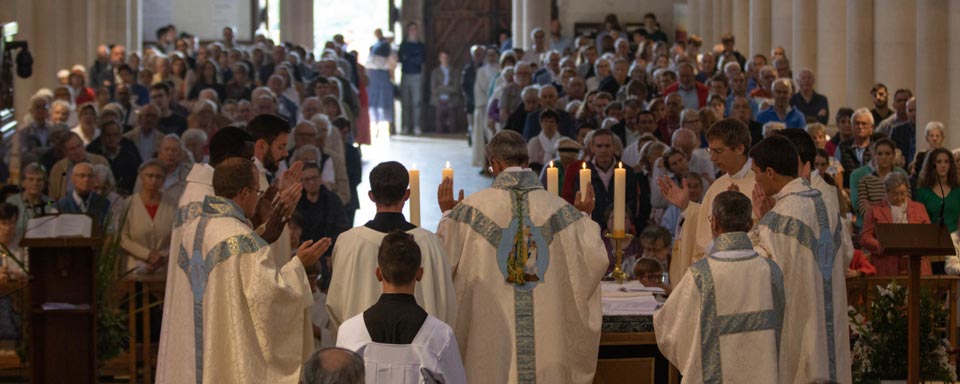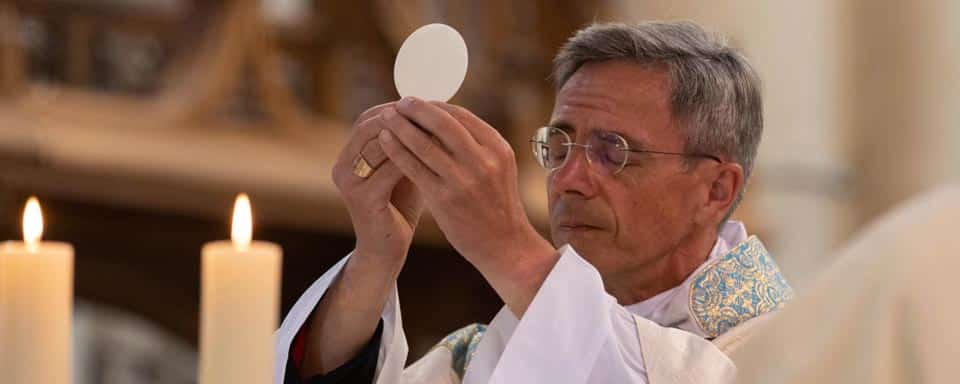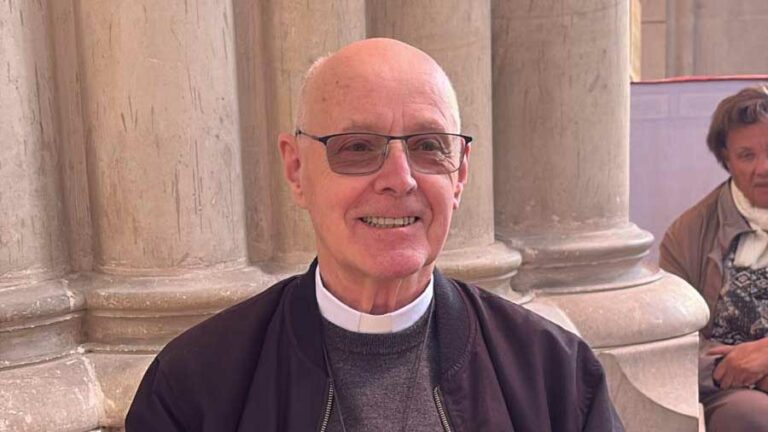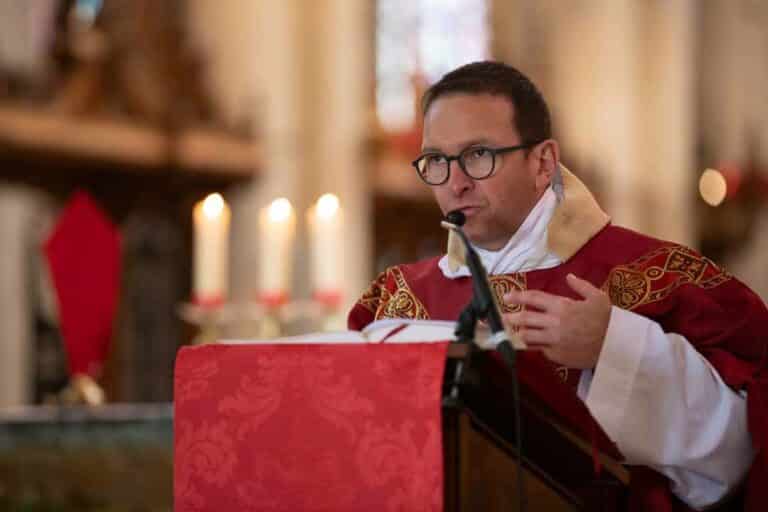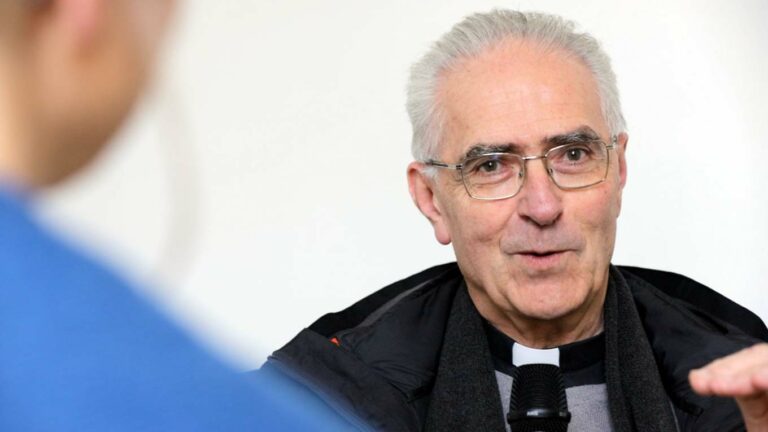”Contrary to appearances, we are not the ones who are paying a visit to Mary at this shrine. She is the one visiting us!”, affirmed Monsignor Bozo, Bishop of Limoges (France) as he presided high Mass at the basilica on August 15, on the solemnity of the Assumption of Our Lady.
” Rather surprising is it not that on the solemnity of the Assumption – part of the glorious mystery of the Rosary – the Gospel proposed by the Catholic Church is the one relating the Visitation, part of the joyful mysteries.
Is there no Gospel on Mary’s Assumption? Well, no, not quite. As you know, the New Testament says nothing about the last part of Mary’s life. Thus, is the Church not overdoing it then? Does she not give unreasonable prominence and privileges to this “humble servant“, as Mary defines herself? Was there any need for these two late dogmas of the Immaculate Conception and the Assumption?
Such dogmas are not papal edicts! They are simply the tardy translation, by the Church magisterium, of the sensus fidei, in the sense of the faithful’s belief. It was amidst the holy people of God that the conviction was gradually forged that Mary, who did not share in the fall of Adam, had not experienced the corruption of the tomb. There are neither relics of Mary’s body nor of Mary’s tomb.
Let us come after the Blessed Virgin in this magnificent chronicle. WYD participants, including myself, are happy to find in the foreword of the Visitation narrative the very theme given by the Holy Father: “Mary arose and set out in haste” (Lk 1:39). The ”Αναστασα δε Μαριαμ” is also the verb of the Resurrection. Mary rises as if resurrected, because a moment ago she heard the Angel’s announcement and from then on, she bears in her womb the source of Life.
So then, why this Gospel of the Visitation today? Maybe because in it, Mary foretold what we are celebrating today: ”From now on, all ages will call me blessed”. That is the first beatitude in Luke’s Gospel. The Assumption is a beatitude.
She, who knew to take time in order to ”reflect in her heart”, during that decisive and such a mysterious moment, did not stop to wonder about the consequences of the Yes she had just given to the angel of the Lord. She hurried off to her cousin Elizabeth.
In his Gospel, Luke presents us with the jubilant encounter between the young virgin and the old barren woman, who both bear life as a pure gift from God, the master of Life.
On the Assumption day, Mary is the one visiting us
Inspired by the Holy Spirit, Elizabeth’s exclamation is familiar to us: “Blessed art thou among women”. This explains Elizabeth’s surprise: ”And how does this happen to me, that the mother of my Lord has should come to me?” We too are surprised for she comes to us today, the Mother of the Lord, she comes to each one of us. Contrary to appearances, we are not the ones who are paying a visit to Mary in this shrine devoted to Our Lady. She is the one visiting us! And she does not come alone, she brings us her Son! And with Him, the whole wealth of Faith and Salvation.
Not only does she offers us Jesus, but she herself bears witness to salvation in Jesus. For if Mary is the mother of the Saviour, she is also the first redeemed. She was not put aside from humankind, like Adam’s descendants, she needed to be freed from the yoke of sin.
She is “blessed among women”, because of her unique role in the history of salvation. And thus, she is saved from sin in an eminent way, by anticipation and from the very first moment of her conception “by a grace issued by the Death of her Son”. She is, as it were, forgiven in advance.
And just as at the beginning of her life she anticipated the gift of redemption – that is the Immaculate Conception – in a similar way, at the end of her life she anticipated the resurrection of the flesh – thus, the Assumption. As we heard in Paul’s letter to the Corinthians: “in Christ all will receive life, but each in his own place”. Mary is in the first place. She is privileged not because she is above ”ordinary mortals”, and counted among a few lucky and ”happy few”, but because God “did not want her to know the corruption of the tomb, she who bore your own Son in her flesh”, like the preface of this feast celebrates.
The Assumption reveals the sacred nature of the human body
Sin, death and the degradation of the tomb, which are part of our human condition, are consequences of rejecting God, as we heard in the second reading. The separation of body and soul at the hour of our death is not a liberation, but lack. Our body is not the temporary envelope of our soul, moreover neither its prison; it is a part of our personality, of our identity. God does not want such a marvel to be destroyed forevermore. Thus, what we call the “resurrection of the flesh”. It’s very mysterious, and can only be appreciated by contemplating the risen Jesus, and Mary in her Assumption. They are the image of what we are called to become.
This is why part of our vocation is to respect the human body, the temple of the Spirit, and to respect it from the start in the mother’s womb, where as today’s Gospel states, it is fully alive – “the child leaped for joy in my womb” – and to respect it at every stage of life, of the entire life, right up to the last moments of its earthly life. How can we not recall it with a sense of urgency and concern, at a time when our country is preparing to legalise euthanasia?
Hence the Assumption is not an invitation to contemplate an inimitable woman in inaccessible light. It evokes our ultimate vocation, and urges us to rise up in haste to follow Jesus, to bring Him to others, and to live already here on earth, in our own body, the life of the Risen One; a life which which will blossom fully in the blessed eternity. Amen.
